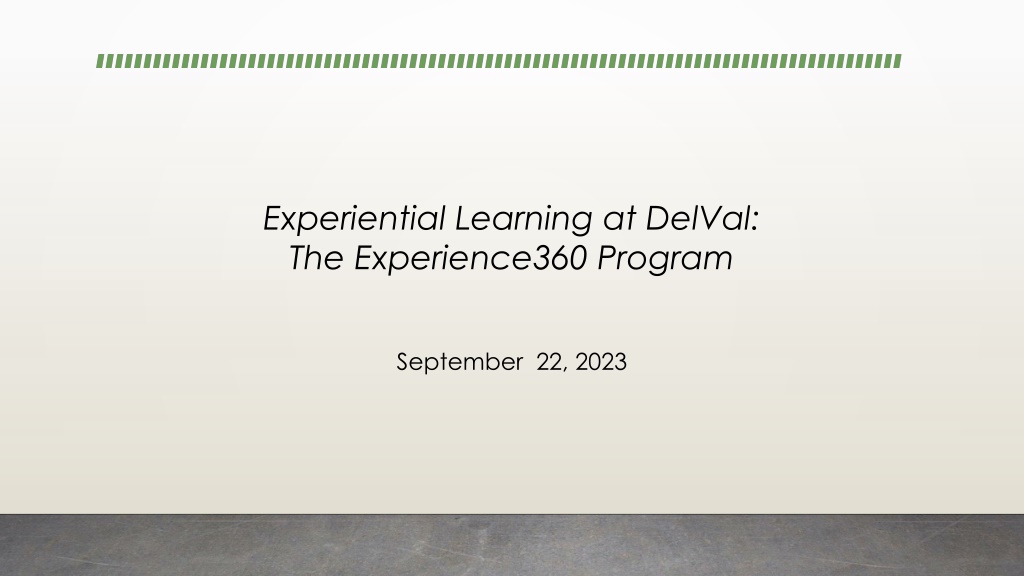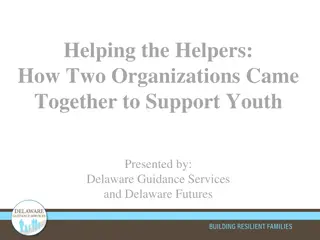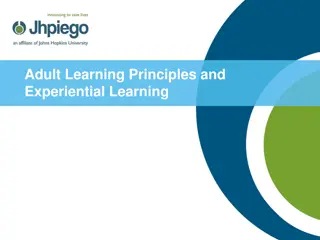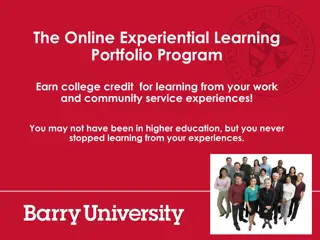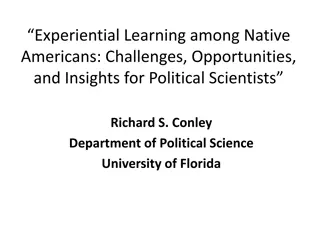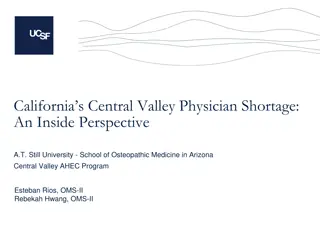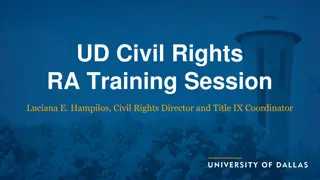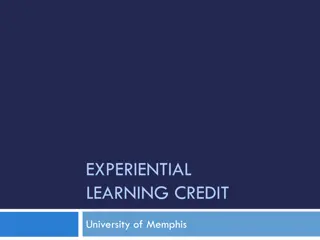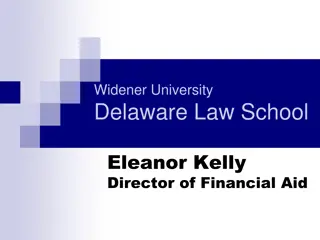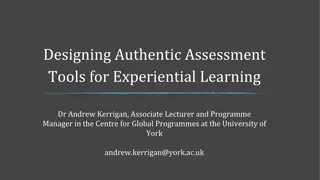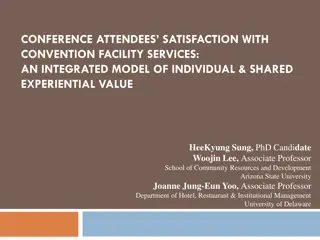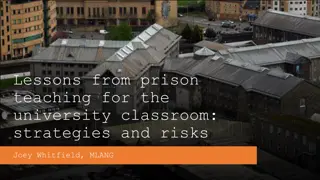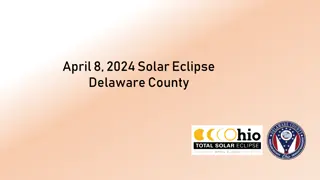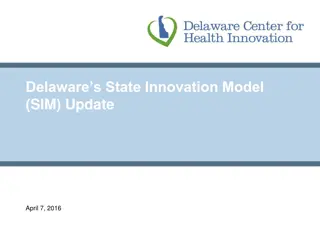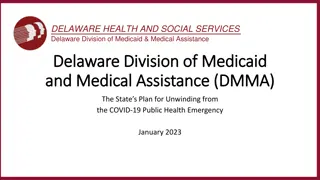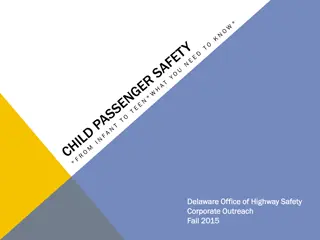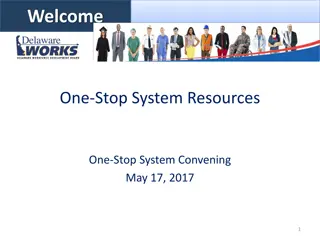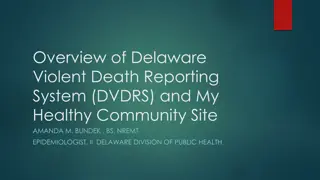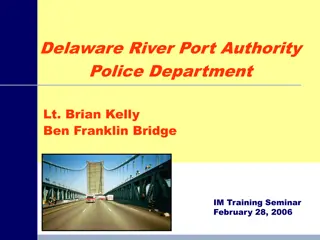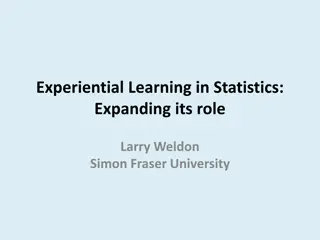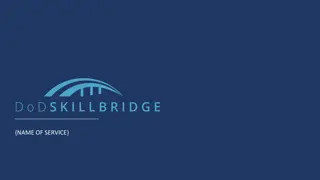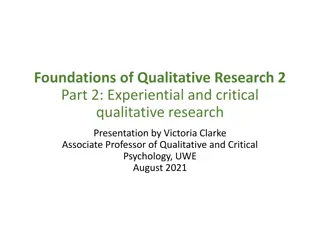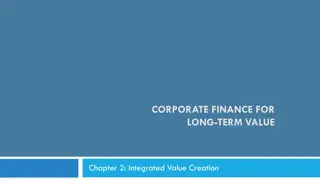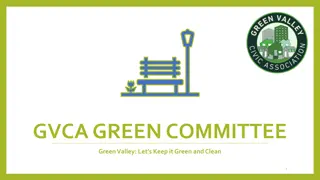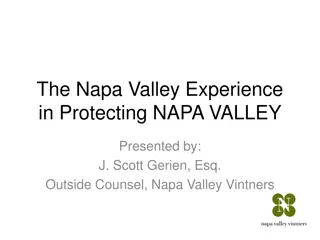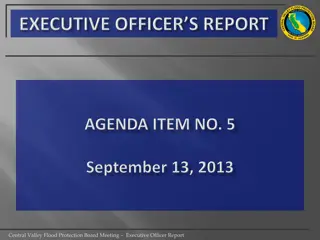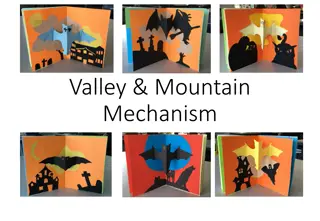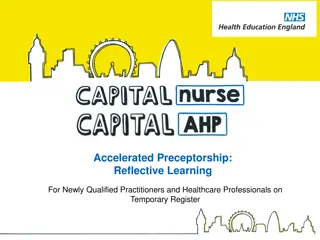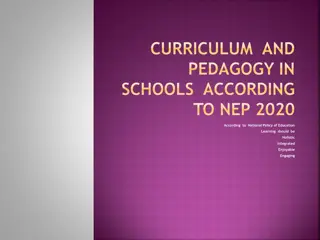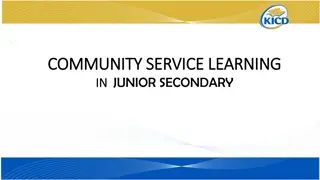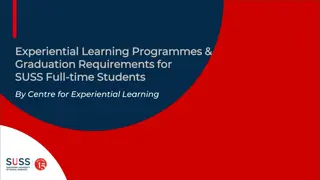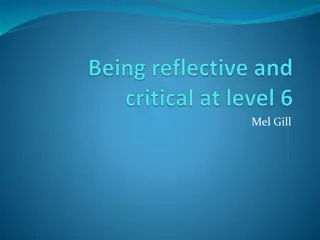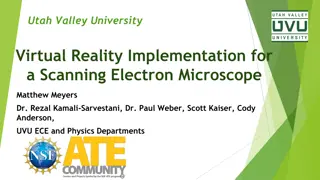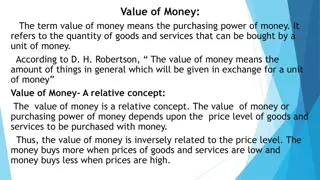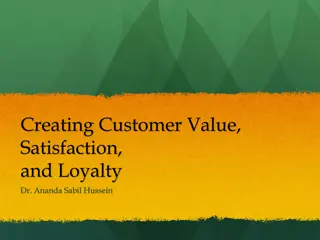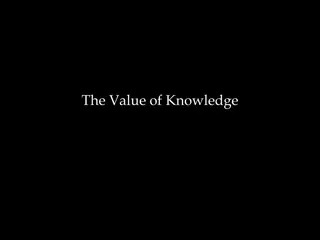The Value of Experiential Learning at Delaware Valley University
Explore the rich history and founding ethos of Delaware Valley University, including its innovative Experience360 Program that emphasizes experiential education. Discover the value proposition of higher education, focusing on internships and the application of experiential learning theory in student development stages. Uncover the essence of learning by doing at DelVal, where science is integrated with practice through the completion of hands-on activities.
Uploaded on Sep 24, 2024 | 0 Views
Download Presentation

Please find below an Image/Link to download the presentation.
The content on the website is provided AS IS for your information and personal use only. It may not be sold, licensed, or shared on other websites without obtaining consent from the author. Download presentation by click this link. If you encounter any issues during the download, it is possible that the publisher has removed the file from their server.
E N D
Presentation Transcript
Experiential Learning at DelVal: The Experience360 Program September 22, 2023
Our Founding and DelVal Today The National Farm School founder by Rabbi Joseph Krauskopf a 100-acre farm in Doylestown, PA, a small classroom building, two faculty and six students Krauskopf spent time with Leo Tolstoy, who advised him to return to America and lead the tens of thousands from your congested cities to your idle, fertile lands Delaware Valley University Small, private university with approximately 1,600 undergraduates and 1,100 acres of land. Rabbi Krauskopf
The Value Proposition of Higher Education Quality Education and Life after college "in almost every college or university's vision statement, there are two related components that constitute its mission. One calls for providing a quality education to its students, while the other focuses on students' preparation for life after college" (Chan & Derry, 2013, p. 28). Internships as an integral part of higher education Council for the Advancement of Standards in Higher Education
Experiential Education Dewey education and experience to foster learning. Freire students and teachers as learners in problem-posing education. Kolb Experiential Learning Theory "learning is the process whereby knowledge is created through the transformation of experience" (Kolb, 1984, p. 38). Sweitzer and King Development Stages of an internship the pedagogy of internships, drawn from the pedagogy of experiential education, requires an engaged stance as students actively reflect on their experiences and draw conclusions (Sweitzer and King, 2013, p. 60).
Experiential Learning Theory A cyclical four stage process that moves a student though concrete experience to reflective observation to abstract conceptualization to active experimentation (Bergsteiner & Avery, 2014). Identifies four learning styles: converger, diverger, assimilator, and accommodator (Collins & Roberts, 2012). The learning styles can inform how a student may experience and interact with different environments. (Kolb, 1984).
Founding Ethos Science with Practice Always part of a DelVal education Employment Program Completing 400 hours before graduation Limited oversight and coordination Experience360 Program Learning by Doing Based on completing at least 2 Activities embedded in the student s academic program
The Experience360 (E360) program Program launch in Fall 2012 Four-year pilot First graduates in the Class of 2016 Graduation requirement for all undergraduate students Greater focus on student development of knowledge and skills Real time reflection in course Part of their learning as a student from day one DelVal Experience I and DelVal Experience II
DelVal Experience II Part of the Core Curriculum Pre-requisite for the E360 Program Problem Based Learning to explore Career Exploration Professional Development Ongoing Transition Support Campus Engagement E360 Program Structure Repetition, repetition, repetition Full360 Student Blog at the Club & Org Expo
The Experience360 Program (E360) Program Scheme Student developed learning objectives for their activity E360 Staff Review Site Supervisor Review Department Chair Review Student is at site and enrolled in an online course Online course supports real time reflection about the experience at the site Completion of Hours and Passing Course to complete activity A student needs to complete the hours and pass the course to successfully complete the activity
E360 Program Outcomes & Learning Outcomes Skill Development Articulation of Learning Student Learning Objectives Student Self-Evaluation Site Supervisor Evaluation
E360 Activities Academic Internship Career Exploration Experiences Civic Engagement Community Service Student Research Leadership Development Study Abroad
The Experience360 Program (E360):Outcomes Class Year Career Outcomes Rate 88.3% 87.7% 90.7% 91.2% Class of 2014 Class of 2015 Class of 2016 Class of 2017 93.2% Class of 2018 94.4% Class of 2019 91.5% Class of 2020 89.1% Class of 2021 94.4% Class of 2022
Whats next for E360? Clearly outlined and articulated program outcomes and program expectations Institutions and employers should explicitly state to students what learning can or may occur due to academic internship participation Every student should has access to the experience Implementing practices that make internships more accessible (Paid/Unpaid) Providing at least a satisfactory experience for every student who engages in an internship Expanding Partnerships with Industry and Community Examples: Mountaire Farms; URBN and Terrain; Doylestown Health
But how do we know? The Value Proposition of Higher Education Experiential Education Internships as part of the Value Proposition Acquisition of Skills, Competencies and Knowledge as a result of Internships Graduate Preparedness and Competency Development Communication, Critical Thinking, and Professionalism
Background National Survey of College Internships (NCSI) 2021 Report from the Center for Research on College-Workforce Transitions. Highlights many variables that need further research to inform understanding of internships. Four skills reviewed by the NCSI were: communication, problem-solving, supervising others, and teamwork. While the pilot has many takeaways, a takeaway for this study was that 1 in 4 students reported an internship experience that was less than satisfactory (Hora, Colston, Chen, & Pasqualone, 2021).
Internships as part of the Value Proposition High Impact Practice assorted Kuh and Kuh et al. research Themes of accessing an internship, program factors, and institutional design are being studied to determine how institutions provide an equitable experience to every student who engages with an internship program (Hora & Chen, 2020) Some benefits related to the student experience are: greater insight about the industry, clarity on personnel and career goals, and the possibility for advancement in the company after the internship experience (Coco, 2000)
Internships are part of a critical phase in students psychological and professional development. Understanding how they are interpreting these experiences can provide valuable information for appropriate, positive, and effective program creation. Center for Research on College-Workforce Transitions, 2019, p. 3
Graduate Preparedness and Competency Development The Internship Communication Communic ation Professionalism Critical Thinking Professionalism Critical Thinking A Prepared Graduate?
Methodology Descriptive Qualitative Single Case Study A qualitative research method allows the researcher to understand the meaning of the experience for those involved (Creswell, 2007). A case study is an empirical inquiry that investigates a contemporary phenomenon (the case ) in depth and within its real-world context, especially when the boundaries between phenomenon and context may not be clearly evident. (Yin, 2014, p. 16).
Methodology Subjects for Artefact Review: Students: 112 sets of student learning objectives (448 individual learning objectives) 103 student self-evaluations included qualitative feedback Site Supervisors: 102 responded to both a Likert scale and qualitative feedback; 10 site supervisors submitted only the Likert scale Participants for Interviews 15 consented to be interviewed; of that 11 scheduled an interview; of those, 10 participated in an interview
Methodology Data Analysis Descriptive Statistics Likert Scale Questions from the Site Supervisor Evaluation Data and Student Self-Evaluation Data Qualitative Data Coding Themes: Communication Course Syllabus Site Supervisor Evaluation Data Studeny Learning Objectives Data Student Self-Evaluation Data Interview Transcript Data Critical Thinking Professionalism Experiential Learning Internship Experience
Results Without this program, I might not have sought out an internship before graduation, but it was a very fun experience and taught me so much so I am grateful that the program gave me that first push and guided me through what to look for and take from an experience. The hands-on experience and forcing the students to get involved in the field early was very helpful. (Subject 103) The course itself didn't feel like it benefited me at all. I'm not planning on reflecting at my job in the future or setting goals for myself. It added pressure to my internship, and it took some of the joy away from it. (Subject 4)
Additional Noteworthy Findings Artefact date and interviewee transcript data provided extensive examples of other competencies and technical skills addressed based on participation in the academic internship. Site Supervisor Evaluation: Despite the broad spectrum of work she completed, (Student) was quick to pick up and improve upon laborious tasks and advanced tasks in the laboratory. (Subject 62) Student Learning Objective: Develop hands on experience in evaluating / observing psycho-social and mental health needs of children in a community- based setting. (Subject 71)
Additional Noteworthy Findings Artefact date and interviewee transcript data provided extensive examples of other competencies and technical skills addressed based on participation in the academic internship. Student Self-Evaluation: Overall I have developed the basic programs used in the media field. I am now very familiar with Hootsuite and also InDesign. (Subject 35) Interviewee Transcript: Oh geez, what didn't I learn? So I learned how to sex birds by looking at feather tips. I learned about moisture loss in eggs. I learned about like the incubation rates. And we got to like dissect eggs. This is weird. But like the ones that didn't hatch, you got to like dissect them and look at why they didn't hatch. Learned about like the overall process. (Interviewee F)
Discussion of the Results - Additional Noteworthy Findings Additional findings highlighted the breadth of competencies and technical skills expressed by site supervisors and students. Academic internships are viewed as an opportunity for students to develop and expand on their existing skills and competencies while learning new skills and competencies. When coupled with the competencies of communication, critical thinking, and professionalism, the additional findings inform how academic internships serve higher education as an experiential learning opportunity.
Relationship to Other Research Experiential Learning Theory: Theory in practice Conceptualizing abstract learning into concrete experiences due to the academic internship. The application of theoretical classroom learning to concrete workplace experience. Students conclude the academic internship experience with new knowledge to take to their next experiential learning opportunity. Developmental Stages of an Internship (DSI-2): Support for the Anticipation Stage of DSI-2 Ensuring students understand the programmatic and course requirements. Developing learning objectives that align with the three competencies or other pertinent competencies. NACE Research: Data in this study differs from that of NACE Site supervisors identified students consistently employing communication, critical thinking, and professionalism competencies in the academic internship experience. Artefact data and interviewee comments showed evidence that students could articulate their learning from the experience related to communication, critical thinking, and professionalism.
Relationship to Other Research Student Perspective and Voice: Understanding the student viewpoint Ensuring students see their classroom knowledge applied in the workplace is an essential feature of the academic internship. All Students in the Study completed an Internship: Single Case Study This addressed a key limitation in some prior research. Students from twenty-two different majors. Acquisition of Skills, Competencies and Knowledge: Defining the terms Soft skills, T-Shaped Theory, Career Competencies, Technical Skills. Added to prior research with a focus on communication, critical thinking, and professionalism. Standardizing through NACE and the Center for Research on College-Workforce Transitions.
Conclusion The research from this study provides one more piece to the complex puzzle that is the impact of academic internships in higher education. Internships are a tool to close the competency perception gap. This allows students to better meet the needs of their future employers and find more fulfilling careers as they enter the world of work. Fulfills one of higher education's core aims to graduate individuals prepared for the complexities of modern society.
Thank you! Overall Questions? Overall Comments?
References Bergsteiner, H., & Avery, G. C. (2014). The twin-cycle experiential learning model: reconceptualising Kolb s theory. Studies in Continuing Education, 257-274. Collins, K. M., & Roberts, D. M. (2012). Learning is Not a Sprint. Washington, D.C.: NASPA-Student Affairs Administrators in Higher Education. Chan, A., & Derry, T. (2013). A Roadmap to Transforming the College-To-Career Experience. Rethinking Success Conference (pp. 1-31). Wake Forest: Wake Forest University. Coco, M. (2000). Internships: a try before you buy arrangement. S.A.M. Advanced Management Journal, 41- 47. Council for the Advancement of Standards in Higher Education. (2019). Internship Programs. Creswell, J. W. (2007). Qualitative inquiry and research design; choosing among five approaches. Thousand Oaks: SAGE Publications, Inc. . Eyler, J. (2009). The Power of Experiential Education. Liberal Education, pp. 24-31. Hora, M. T., Colston, J., Chen, Z., & Pasqualone, A. (2021). National Survey of College Internships 2021 Report. Madison: Center for Research on College-Workforce Transitions. Hora, M., & Chen, Z. (2020). Problematizing college internships: Exploring issues with access, program design, and developmental outcomes. International Journal of Work-Integrated Learning, 235-252. Hora, M. T., Parrott, E., & Her, P. (2019). How do students experience internships? Exploring Student Perspectives in College Internships for More Equitable and Responsive Program Design. Madison: Wisconsin Center for Education Research.
Selected References Kolb, D. A. (1984). Experiential learning: Experience as the source of learning and development . Englewood Cliffs: Prentice-Hall. Kuh, G. D., Kinzie, J., Schuh, J. H., Witt, E. J., & Associates, a. (2010). Student Success in College. San Francisco: Jossey-Bass. National Association of Colleges and Employers. (2018). Position statement: U.S. internships. Retrieved from National Association of Colleges and Employers: http://www.naceweb.org/about-us/advocacy/position- statements/positionstatement-us-internships/ National Association of Colleges and Employers. (2022, March 1). The Competency Gap: Recruiters and students differ in their perceptions of new grad proficiency. Retrieved from naceweb.org: https://www.naceweb.org/about-us/press/the-competency-gap-recruiters-and-students-differ-in-their- perceptions-of-new-grad-proficiency/ National Association of Colleges and Employers. (2022, March 7). What is Career Readiness? Retrieved from National Association of Colleges and Employers: https://www.naceweb.org/career- readiness/competencies/career-readiness-defined/ Sweitzer, H. F., & King, M. A. (2013). Stages of an Internship Re-Visited: Facilitating Learning and Development Through Engagement. Journal of Human Services, 56-72. Yin, R. K. (2014). Case Study Research Design and Methods. Thousand Oaks: SAGE Publications, Inc. Zhang, Y., & Wildemith, B. M. (2005). Qualitative Analysis of Content. Human Brain Mapping, 2197-2206.
Research Questions In what ways do the programmatic requirements of the required concurrent academic internship course and internship align the experience with the development of communication, critical thinking, and professionalism competencies that employers are seeking in college graduates? How does the experience of the academic internship course directly address the three competencies deemed most important and the level of graduate proficiency in those competencies? From the perspective of the site supervisor, in what ways does the academic internship at a particular site address desired and requisite competencies that employers surveyed by NACE identify as important and the level of graduate proficiency in those competencies? From the student perspective, what learning occurred related to communication, critical thinking, and professionalism as a result of completing both an academic internship course and an internship?
